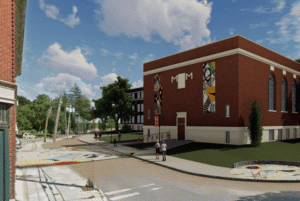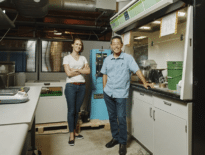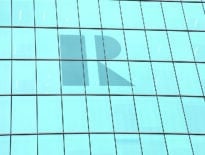
In Fitchburg, NewVue Communities and Fitchburg Arts Museum are converting three abandoned buildings into affordable live and workspaces for the city’s growing creative economy workforce. Image courtesy of ICON Architecture
The year 2024 marks the 24th anniversary of when our state made its first investment from the Brownfields Redevelopment Fund, a program that over the past almost quarter-century has played a critical role in the redevelopment of hundreds of environmentally complicated sites in Massachusetts.
Administered by MassDevelopment, this state program mirrors the goals of its EPA counterpart: to clean up sites impacted by contamination – a relic from the state’s industrial heyday – and put them back into safe, productive use for our communities, as housing, storefronts, offices and more. As we look to the future of our economy, and the urgent need to build new housing to attract and retain our workforce, the Brownfields Redevelopment Fund can play a crucial role. All we need to do is look to our Gateway Cities for examples.
Massachusetts is home to thousands of “brownfields” – buildings and land that are blighted and hampered by chemical contamination. Picture an abandoned mill complex where past manufacturing practices produced harmful pollutants, or a Main Street laundromat whose cleaning solutions have infiltrated the ground.
Brownfields are disproportionately present in our Gateway Cities and some of the state’s oldest communities, places that have been home to industry, historic mills, and dense downtown commercial districts. Imagining a brighter future for these properties is easy.
Yet as local economic development partners tackle the expensive and technically difficult journey of revitalization, the Brownfields Redevelopment Fund provides critical funding, in the form of loans and grants, to make these projects pencil out.
Industrial Relics Reborn as Mixed-Income Housing
In Brockton, for example, a $750,000 brownfields grant is helping community development corporation NeighborWorks Housing Solutions remove oil-contaminated soil from a former tow yard, making way for transit-oriented, mixed-income housing adjacent to the MBTA Commuter Rail station. The development will bring 94 apartments to this Gateway City’s downtown.
In Lawrence, the Brownfields Redevelopment Fund is advancing the creation of an entire neighborhood. Lawrence CommunityWorks’ Union Crossing project has already transformed multiple historic mills around Island Street into dozens of new homes, and will ultimately result in more than 200 units of affordable housing in this now-burgeoning area of the city (which was not zoned for residential use until the early 2000s).
With Brownfields funding, this CDC was able to assess environmental contamination across multiple parcels and remove hazardous materials from soil in the area, kick-starting the rehabilitation of underutilized former industrial buildings into a vibrant, new mixed-use neighborhood that meets the needs of Lawrence today.
Cleaning up a brownfield is a bit like dusting off a canvas before the art is made. Fitchburg is embodying that concept and more by converting three abandoned, once-contaminated buildings into affordable live/workspace for its growing creative economy workforce.
The project, spearheaded by NewVue Communities and Fitchburg Arts Museum, will deliver approximately 68 units of mixed-income housing where artists can live and create. Along with funding from the Collaborative Workspace and Underutilized Properties Programs, which we also administer on behalf of the state, MassDevelopment has advanced this project by awarding nearly $750,000 in Brownfields grants.

Marcos Marrero
From the Brownfields Redevelopment Fund’s inception through fiscal year 2023, it has invested more than $101 million to improve nearly 1,650 acres across Massachusetts – almost half of that investment directed to Gateway Cities. These high-impact dollars have made possible the construction or rehabilitation of more than 8,000 units of housing statewide, at an average investment of about $12,500 per unit.
The Healey-Driscoll administration, legislature and local partners are tackling head-on the challenge of our time: the state’s housing crisis. Estimates show a shortage of up to 200,000 housing units across the state, with low inventory driving prices up and burdening residents. Building on the proven success of the Brownfields Redevelopment Fund achieves two goals at once: eliminating blight for the health of our communities, while setting the stage for much-needed housing units that can support our economy.
Marcos Marrero is executive vice president of community development for MassDevelopment, the commonwealth’s development finance agency and land bank.




 |
| 

